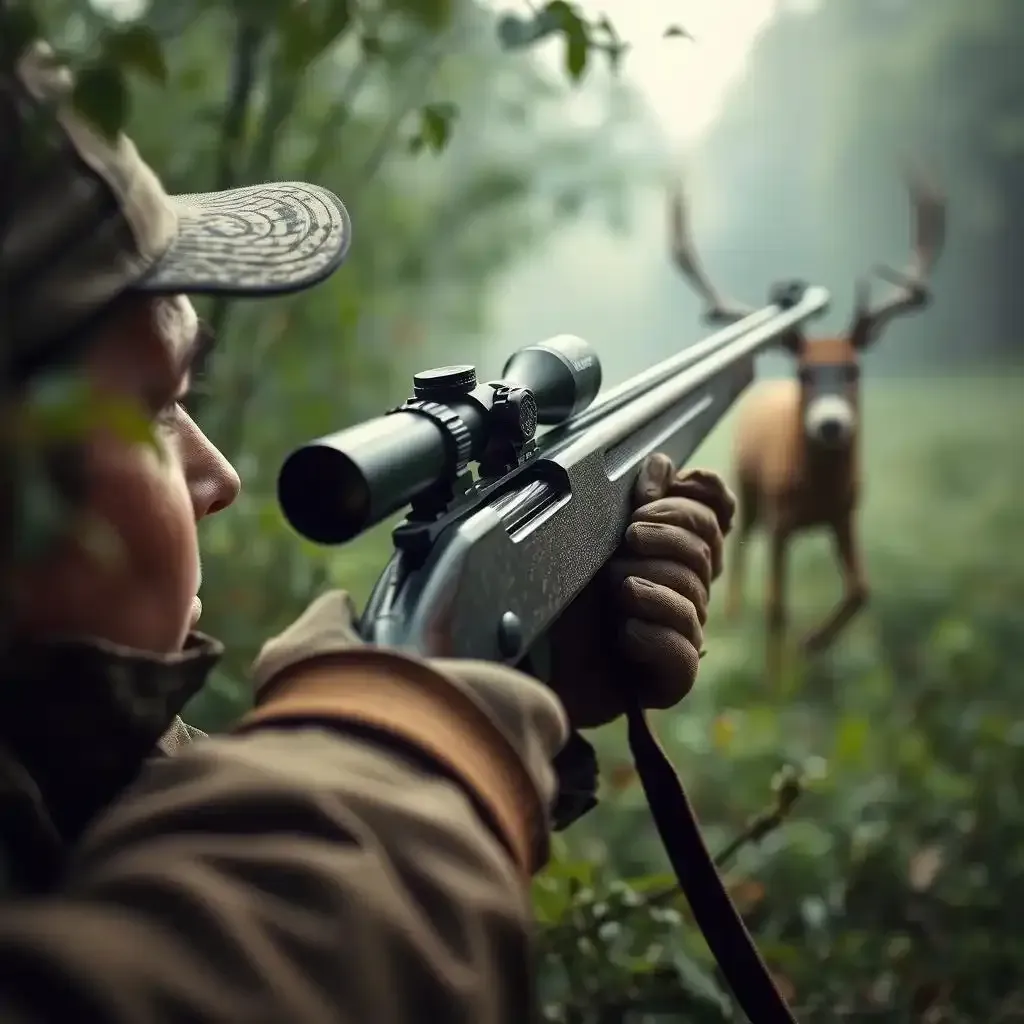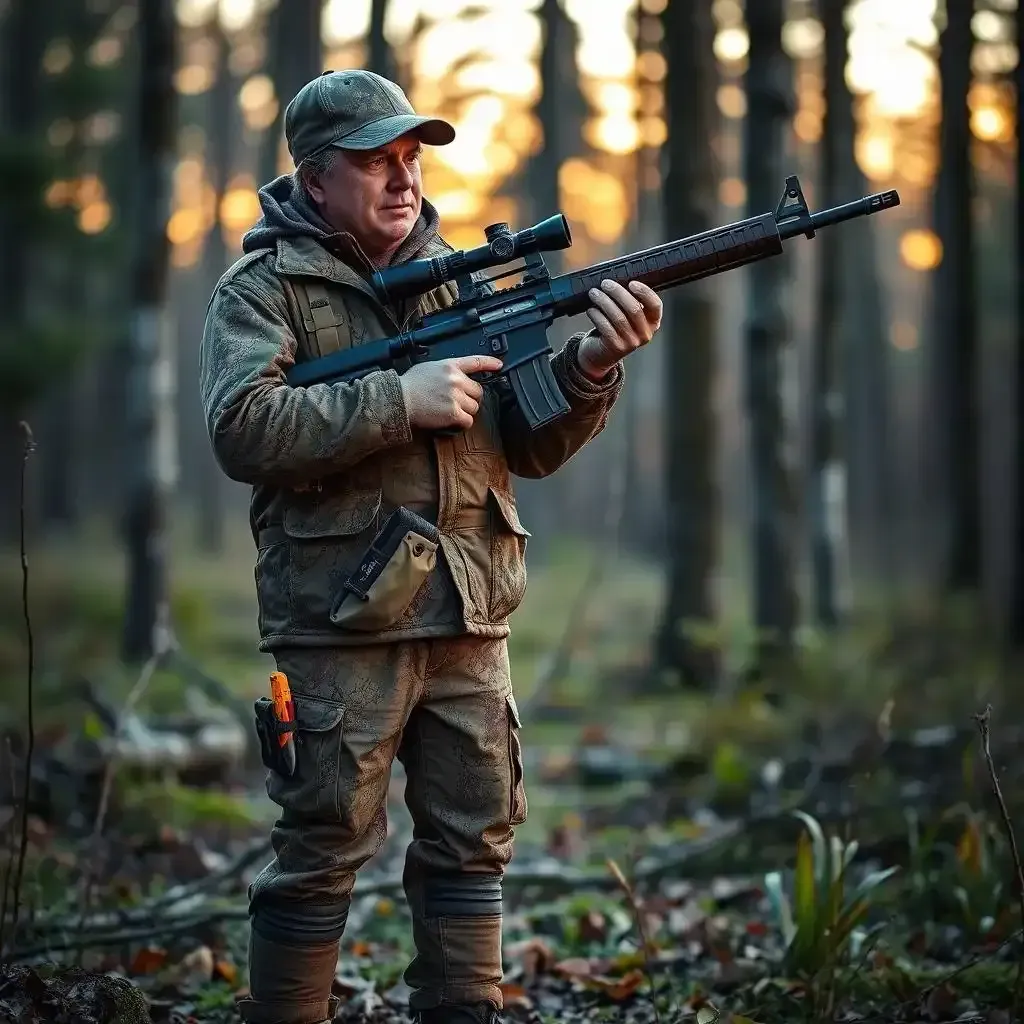Table of Contents
Welcome, fellow hunters! At kittentoyland.org, we understand the thrill of the chase and the importance of having the right tools for the job. Choosing the best rifle for hunting is a crucial decision, impacting your success and safety. This article will guide you through selecting the perfect rifle, considering caliber, range, and game type. We'll also explore essential gear beyond the firearm, ensuring you're fully prepared for your next hunting journey. Whether you're a seasoned pro or a novice just starting, this guide will help you find the best tools for a successful and ethical hunting experience. Remember, responsible hunting practices are paramount. So let's explore into the details and equip you with the knowledge to make informed choices. Find the best for hunting here at kittentoyland.org!
Choosing the Best Rifles for Hunting

Choosing The Best Rifles For Hunting
Picking the best rifle for hunting feels like choosing a superhero for a really important mission. You wouldn't send Superman to fight a tiny ant, right? Similarly, you need the right tool for the job. For small game like rabbits or squirrels, a .22 caliber rifle is perfect – it’s lightweight, easy to handle, and won't overpower the target. Think of it as the Spider-Man of rifles, nimble and precise. But if you're hunting deer or larger animals, you'll need something with more punch, like a .30-06 or a .308. These are the heavy hitters, your hunting Batmans – powerful and reliable. The caliber you choose depends entirely on what you're hunting. Check your local hunting regulations to make sure you're using a legal caliber for the animal you’re after. You don't want to end up like the villain, caught unprepared!
Now, what about the rifle itself? Some rifles are bolt-action, meaning you manually work a bolt to load each round. These are known for their accuracy but can be slower to fire. Others are semi-automatic, meaning they reload themselves after each shot. These are faster but might be less accurate. Which is best for you? It depends on your hunting style. If you prefer a more deliberate approach, a bolt-action rifle might be your thing. But if you need speed, a semi-automatic rifle is the way to go. Think about how you hunt and choose accordingly. You can also consider a lever-action rifle, which is a fun alternative. It's like a classic car – stylish and reliable, but maybe not the fastest.
Game Type | Recommended Caliber | Rifle Type Suggestion |
|---|---|---|
Small Game (Rabbits, Squirrels) | .22 LR | Bolt-action or Semi-automatic |
Deer, Medium Game | .30-06, .308 | Bolt-action or Semi-automatic |
Large Game (Elk, Moose) | .300 Winchester Magnum, .338 Lapua Magnum | Bolt-action (generally preferred for accuracy) |
Don't forget about the scope! A good scope is essential for accurate shots, especially at longer ranges. A scope with a decent magnification will help you see your target clearly, even from far away. Choosing a scope is like choosing the right pair of glasses – you need the right prescription to see clearly. Consider the magnification, the objective lens size (bigger is usually better in low light), and the reticle (the crosshairs in your scope).
Before you buy any rifle, make sure you try it out! Go to a shooting range and test fire different rifles to find one that fits you comfortably. A rifle should feel like an extension of your arm. It shouldn't feel awkward or uncomfortable to hold. If it doesn't feel right, it's not the right rifle for you. Think of it like trying on shoes – you wouldn't buy shoes that pinch your toes, would you? Same goes for rifles!
- Consider your budget.
- Research different rifle brands and models.
- Read reviews from other hunters.
Remember, responsible hunting practices are crucial. Always follow the rules and regulations of your local hunting area. Be sure to identify your target properly before you shoot, and always treat firearms with respect. Safety should always be your top priority. It’s not just about the thrill of the hunt; it’s about being a responsible and ethical hunter. Learn more about responsible hunting practices by checking out our toy safety guide.
Finally, practice! Practice makes perfect, and the more you practice with your rifle, the better you'll become at shooting accurately and safely. Regular practice will build your confidence and skills, making you a more successful hunter. Consider visiting a local range to perfect your skills, or check out some tips on assembling your gear to ensure everything works correctly. Happy hunting!
Best Calibers for Different Hunting Situations
Small Game: Think Light and Nimble
Let's start with the little guys – squirrels, rabbits, and other small game. For these, you don't need a cannon. A .22 LR is your best bet. It's light, easy to carry all day, and accurate enough for close-range shots. Think of it like a finely tuned slingshot – precise and effective. I've personally used a .22 for years to hunt squirrels, and it's never let me down. Just remember to practice your aim – even with a small caliber, you still need to be accurate to make a clean shot. It's all about precision, not brute force. Plus, ammo is super cheap for this caliber, which is great for your wallet.
- Lightweight and easy to handle
- Affordable ammunition
- Suitable for close-range shots
Medium Game: Finding the Right Balance
Now, let’s move up a notch to deer and other medium-sized game. This is where things get a little more serious. For this, you'll want something with more stopping capability, like a .30-06 or a .308. These calibers offer a good blend of strength and accuracy, making them suitable for a variety of hunting situations. Think of them as the Goldilocks calibers – not too big, not too small, just right. I use a .308 myself – it's reliable and accurate, and I feel confident using it for deer hunting. But remember that shot placement is still crucial, no matter the caliber. A poorly placed shot with a powerful rifle is just as bad as a poorly placed shot with a smaller caliber.
Want some more advice on choosing the right gear? Check out our local toy guide for some helpful tips and tricks.
Caliber | Pros | Cons |
|---|---|---|
.30-06 | Powerful, accurate, widely available | Can be a bit heavy for some hunters |
.308 | Good balance of strength and accuracy, less recoil | Slightly less powerful than .30-06 |
Large Game: The Big Guns
Finally, we have the big boys – elk, moose, and other massive game animals. For these behemoths, you'll need a serious caliber. Think .300 Winchester Magnum or even a .338 Lapua Magnum. These are heavy hitters, packing a serious punch and capable of taking down large game at longer ranges. These are not for the faint of heart, though. They have significant recoil, so you'll need to be comfortable handling a powerful rifle before you even think about using them. I’d recommend going to a shooting range to practice first. Safety first! And remember, ethical hunting practices are always paramount, no matter what caliber you choose. A clean, quick shot is always the goal. Learn more about responsible hunting on our .
"The best caliber is the one you're most comfortable and proficient with." - Old Hunter's Saying
- Powerful calibers for large game
- Significant recoil – practice is essential
- Ethical hunting practices are paramount
Essential Gear Beyond the Best Hunting Rifle

Essential Gear Beyond The Best Hunting Rifle
Optics: Your Hunting Eyes
Okay, so you've got your awesome rifle – congrats! But even the best rifle is useless without good optics. Think of your rifle scope as your super-powered binoculars. It lets you spot that perfect buck from way across the valley, even if it's hiding behind a bush. A good scope needs to be clear, and it should be magnified enough to see those small details – like the difference between a doe and a buck. I always go for a scope with at least 4x magnification, but 6x or even 10x is better for longer shots. And don't forget about the mount! Make sure your scope is securely attached to your rifle – you don't want it shifting around during recoil. That would be seriously annoying! A wobbly scope is like a wobbly ladder – not fun at all.
- Magnification: Higher is better for longer ranges (but harder to use up close).
- Clarity: A clear scope makes all the difference in spotting game.
- Mount: Make sure it's sturdy and secure!
Remember, a good scope is an investment, it’s like buying a really good pair of shoes for a marathon. You wouldn't run a marathon in flip-flops, would you? Choosing the right scope is just as important as choosing the right rifle itself. Check out our guide on for more tips!
Clothing and Accessories: Dressing for Success
Next up: your hunting clothes. Don't think you can just throw on any old shirt and pants. Hunting can involve sitting still for hours, or scrambling through thick brush, so you need clothes that are comfortable, durable, and appropriate for the weather. I usually layer my clothes, that way I can adjust for changing temperatures. A good base layer helps wick away sweat, a mid-layer keeps you warm, and an outer layer protects you from rain or wind. Think of it like building a cake – each layer is important! And camouflage is key – it helps you blend in with your surroundings, making it easier to get closer to your target. You wanna be sneaky, like a ninja! Finally, comfortable boots are crucial. You’ll be doing a lot of walking, so make sure your feet are well supported. Blisters are no fun at all, trust me.
Gear Item | Importance | Recommendation |
|---|---|---|
Base layer | Moisture-wicking | Merino wool or synthetic material |
Mid-layer | Insulation | Fleece or down jacket |
Outer layer | Waterproof/windproof | Gore-Tex or similar material |
Boots | Support and comfort | Waterproof hiking boots |
Beyond clothing, you'll need other essentials, like a hunting knife (for field dressing), a rangefinder (to accurately judge distances), and a first-aid kit (because accidents happen). You can find more information on on our website!
Final Thought
Ultimately, the "best" hunting rifle is the one that best suits your individual needs and hunting style. Careful consideration of factors like game type, hunting environment, and personal preferences is key. Remember to prioritize safety, practice regularly, and always hunt responsibly. Happy hunting!